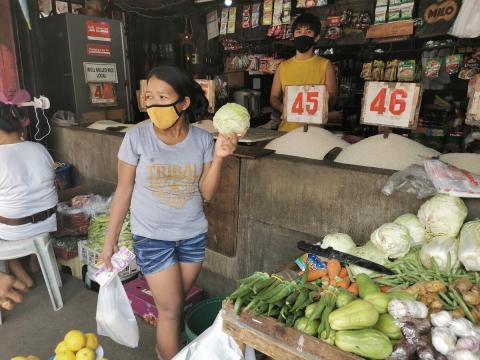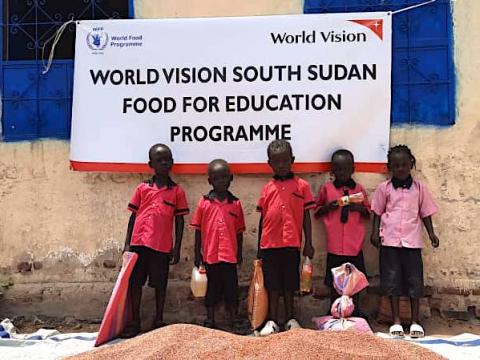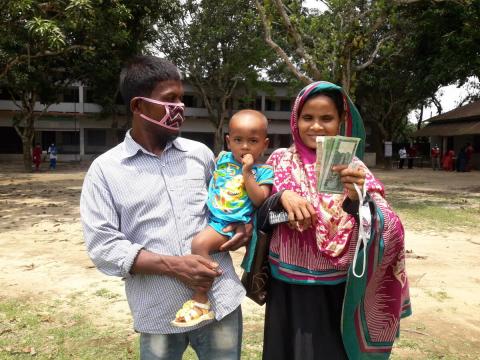
We're running out of time
By Norbert Hsu, Partnership Leader for Global Impact
“The cost of living has become more challenging than the disease.” Mindaye, a mother of two in Ethiopia, simply and painfully articulates the problem facing millions of parents around the world. “I am worried about what to feed my children, about their future, full of uncertainty about what tomorrow holds.”
In an Ethiopian market town, on the Venezuelan border, in the north of Syria, in eastern Democratic Republic of Congo, millions of vulnerable families share one terrible thing in common. If you’re in lockdown, you’re not working and you and your children are going without food.
As my colleague Rami in Idlib, Syria, said recently, people have to choose between COVID-19 or starvation.
If five months ago you found life tough trying to provide your family with two good meals a day, imagine the horror and stress today when you are not able to do even that. In these cases, we do whatever we need to in order to survive. We make the impossible choices, take the worst decisions. For some parents, this will mean sending their children out to beg. For others, it will mean pushing their daughter into marriage at the age of 14, believing it’s the least-worst thing for her right now.
We know this is happening all over the world. Our rapid assessments in countries across Latin America, Sub-Saharan Africa, and Asia told us what we feared: We are on the cusp of a catastrophe for children. An estimated 85 million families across Asia have little or no food stocks and 110 million children are going hungry. Children are out of school, where so many receive their only nutritious meal of the day. One in three Venezuelan migrant children is going to bed hungry and small business owners in Africa – mostly women – are spending less money on healthy food.
It is clear that desperate parents and caregivers are finding it increasingly difficult to provide their children with healthy nutritious food and buy medicine and vital hygiene products.
Due to the pandemic, millions of children cannot attend school. Combined with parents’ loss of income and worry about what comes next, tensions can increase at home, putting even more children at risk from violence and abuse. Then there are the less obvious psychosocial effects -- the loss of hope and the feelings of despair.
Our work is trying to provide these families with another option. A pathway out of the dark cloud of impending extreme poverty, where just a few months ago it looked like there might be some light ahead.
There is no one-size-fits-all approach. What they need right now are people to walk alongside them, listen to them and respond. Food is no good if what they need is money to pay for medicine. Personal protective equipment isn’t going to feed their children. Even though thousands of our staff are working long hours to make sure we’re working with communities to provide people with what they need, not what others think they should have.
This is why in the first 100 days, we distributed more than US$17 million worth of cash or vouchers to more than 985,000 people. It is why we reached more than 4.1 million people with food assistance and, where school closures have restricted children’s access to school meals, we have redesigned these programmes as take-home rations.
But, food and cash are not long-term solutions, which is why we are poised to help people recover and rebound as soon as it is safe to do so. We are doing this by:
- Providing disaster recovery loans for micro, small, and medium enterprises with VisionFund, our microfinance subsidiary, as soon as the peak of the crisis has passed and businesses are able to restart trading. (VisionFund works with more than 1 million micro and small business owners with savings groups in 28 countries that have benefitted more than 3.5 million children).
- Analysing disrupted market systems to identify recovery strategies that both engage market forces and support the productive capacity of poor households with the goal of sustainable economic recovery in 70 countries; given the concentration of the poor in agriculture, we are focusing on food and agriculture market systems, subsistence farmers and rural households, with particular attention on women’s economic empowerment.
- Providing extremely poor households, particularly ones headed by women, an integrated package of assistance, savings groups, training and assets, to help families return to farming, reopen their shops, earn income, save and build resilience.
A prolonged and uncertain crisis like this wipes out the often small but significant savings the world’s poorest families have been able to set aside. This is why we support some of the 54,400 Savings forTransformation groups we have grown and supported over the past 10 years to find new ways for these groups to continue. Amongst the groups, 1.3 million members, the majority of whom are women, care for more than 865,800 children. In the first 100 days, we helped 3,785 savings groups adapt, continue to meet and save.
We are not done looking at what we can still learn. As the long-term livelihoods crisis starts to become a reality, our need to adapt and prepare families for the future is more important than ever.
Every problem needs to be reframed so we can find new, innovative solutions.
We have hope. We have faith there is a way through this global crisis. We have faith in a God who can conquer all of this.
Learn more about how we are helping limit the spread of COVID-19 and protect those affected and the impact our programmes have had in the first 100 days.

